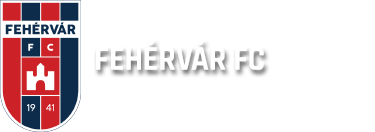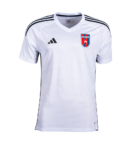Ajánld ismerősödnek!
Az ajánlást sikeresen elküldtük!
We sat down to talk with our new summer signing.

Three-time Hungarian league champion Marcel Heister joined MOL Fehérvár FC on 16 June, giving him the opportunity to get to know the coaching staff and his teammates at the training camp. We sat down to talk to Vidi's new number 55 before the end of the training camp.
How does a young German player go from Hoffenheim's second team to Zadar on the Croatian coast?
In Germany, there are strong teams in the third and even fourth division, but when I was young I felt I needed a change because I wanted to play in a first-division team. At Hoffeinheim, I trained occasionally with the first team, which was already in the Bundesliga at the time, but it was not realistic to get many opportunities there at the age of 18 or 19. My family was in Croatia and I went there every year, so I decided to continue my career there.
Was it easy to switch to another football culture when you were young?
I played for two smaller clubs, Zadar and Istra. We struggled a lot against relegation, but I still have fond memories of that period. I learned a lot during those seasons. It was not difficult to adapt to the Croatian style of football, and I made a lot of good friends during those four years.

When you were a child, was it always clear that you would make a living from football?
Nobody in the family played football, I mean professionally, because my father played football as a hobby, of course. I always had the ball at my feet, I admired Ronaldinho's game as a child, and I liked to wear the Brazilian national team jersey with his name on it.
Even after the 2002 World Cup final, when Brazil had just beaten Germany in the final?
I wasn't disappointed, I was still young. I didn't really care about the result of the games, I was just happy to see the big goals and the nice tricks.
Speaking of being selected - earlier in an interview, there was even talk of you playing for Hungary. Is there any reality to that?
Yes, this topic has come up, and I do have a little Hungarian connection, as my great-grandmother was born in Hungary. But that's not enough to become a Hungarian citizen, and of course you need that to qualify for the Hungarian national team, and also to have played here for five years without interruption. I am now at three years.
Back from the future to the past: after two so-called smaller Croatian teams, a big Israeli club, Beitar, followed. How did you feel in your new country?
In Israel I had the chance to play for a really big team, and Beitar is the only club in Jerusalem. It has a lot of fans, it's one of the best supported clubs in Israel and I loved being there. I think the fans liked me too, whenever I went to a restaurant or a café, almost always people I didn't know would come up or invite me, because everyone was supporting for Beitar.

After that, how much did you think about continuing your career in Hungary?
I had been to a Beitar-FTC training match before, maybe a year before my transfer, where I saw a very small slice of the club's organisation and after the interest I looked into Hungarian football. I read and heard good things, and in the end the positive things were confirmed, as everything is very organised. We play in very nice stadiums and I know that a lot has been invested in football here. I also got closer to Croatia, to my family and my wife's family. She is also Croatian. And my parents, although they work in Germany, they spend a lot of time in Croatia.
Interesting, although the name Heister suggests German ancestry.
Yes, that's right. I don't know where our family name came from, but my father is Croatian, he was born there.
You have played against Vidi several times as an FTC player, how do you remember these matches?
I wouldn't say a match or a moment in time, but rather that I think the players on both teams knew that these two clubs would be in the race for the league title and that it would be a tough battle in all three games, or even in the cup if we met.
What were the reasons for you to continue in our country after it was decided that you would not stay at Ferencváros?
The three years I spent in Ferencváros were successful in terms of my career, so I feel good in Hungary in all aspects, but more importantly, my family has grown to love the country. I have decided not to move away from here - although a move to Fehérvár was already in the pipeline. Footballers talk to each other regardless of their club affiliation, so I've heard a lot of good things about the club and that played a part in my signing. I'm very confident that I'll be as successful in a Vidi shirt as I have been for the last three seasons. Of course, it will take hard work, but that won't be a problem.

You met the coaching staff and your new teammates for the first time right at the training camp. What are your first impressions?
Yes, it's an intense start for me, I'm in the middle of summer pre-season, so it's natural to work a lot. And it's a basic thing that a new signing has to show himself even more. Of course, I'm not coming into the unknown, I've met and talked to a lot of players, admittedly as opponents so far, but everyone has been very welcoming and I feel comfortable.
I understand that you often spend your free time with Palko Dárdai, who grew up in Berlin, for example and you were in the same boat during the rafting trip. Have you managed to make good contacts with him in such a short time?
Yes, of course, Palko is easier to communicate with because of the German language, I talk most with him and his roommate Dani Kovács, but I also have a good relationship with the others. We have good guys in the squad, I'm very confident that we will be successful together.
 Június 30-án sorsolják az OTP Bank Liga következő szezonjának menetrendjét
2022. Június 25.
Június 30-án sorsolják az OTP Bank Liga következő szezonjának menetrendjét
2022. Június 25.
11:00 órakor kezdődik a sorsolás.
 Michael Boris értékelte a Dunaújváros elleni mérkőzést
2022. Június 24.
Michael Boris értékelte a Dunaújváros elleni mérkőzést
2022. Június 24.
Vezetőedzőnk elégedett volt azzal, amit a felkészülés ezen szakaszában látott a csapattól.
 Babos Bence: "Álmodni sem mertem ilyen debütálásról a Vidiben"
2022. Június 24.
Babos Bence: "Álmodni sem mertem ilyen debütálásról a Vidiben"
2022. Június 24.
18 esztendős támadónk első meccsén a Vidiben az első labdaérintéséből gólt szerzett.
 Claudiu Bumba a MOL Fehérvár FC játékosa!
2022. Június 24.
Claudiu Bumba a MOL Fehérvár FC játékosa!
2022. Június 24.
Az elmúlt három szezonban 21 gólt szerző és 17 gólpasszt kiosztó középpályás a Vidi első nyári igazolása.
 Két török és egy ciprusi csapattal játszunk nemzetközi felkészülési mérkőzést Ausztriában
2022. Június 24.
Két török és egy ciprusi csapattal játszunk nemzetközi felkészülési mérkőzést Ausztriában
2022. Június 24.
Július 3. és 15. között Ausztriában edzőtáborozik a Vidi, ezidő alatt három nemzetközi edzőmeccset játszik Michael Boris együttese.
 Győzelemmel kezdtük a szezont
2022. Június 24.
Győzelemmel kezdtük a szezont
2022. Június 24.
Felkészülési mérkőzésen Petrjak, Babos, Dárdai, Hangya és Papp góljaival nyertünk Dunaújvárosban.










































